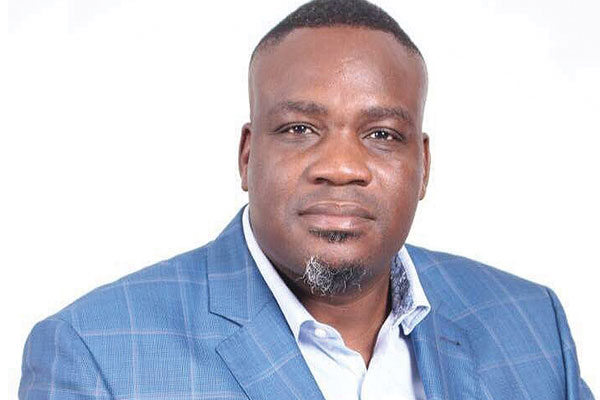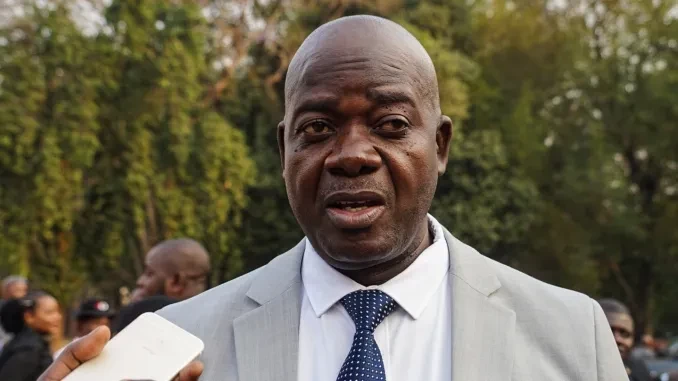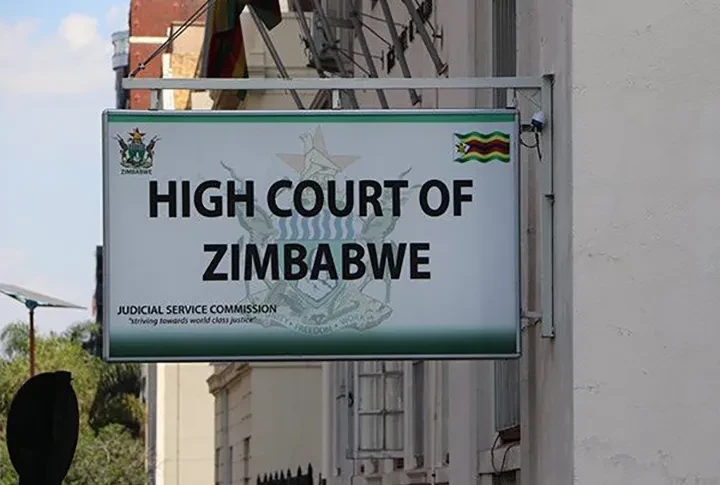
Charlton Hwende, the secretary-general of the Movement for Democratic Change (MDC-Alliance), is facing a treason charge for allegedly subverting President Emmerson Mnangagwa’s government after Twitter posts encouraging citizens to protest economic hardships.
But that is the least of his concerns. Hwende, a Parliamentarian representing Kuwadzana East constituency, is worried that government is setting up massive infrastructure to spy on citizens. Towards the end of last year, his parliamentary vehicle was installed with a GPS tracker without his knowledge. This was meant to monitor his movements, he said, infringing on his privacy.
“I’ve heard spies telling me things I said to my family on the phone organising my own household,” Hwende said, highlighting the extent of surveillance targeted at opposition members.
“The phones are bugged,” he said, worriedly.
About the tracker on his vehicle, he said he was “tipped off by an insider”.
To demonstrate that they were tracking his vehicle, the informant forwarded a message generated by the tracker to his WhatsApp number: “Your tracker is active,” it said. “You were stationary at Cnr Angwa/Mandela. Now going east along Mandela.”
This perturbed Hwende, who had never installed the device on his vehicle.
“I have raised a complaint with our parliamentary chief whip about the illegal installation of the tracker on my vehicle,” he said.
- Chamisa under fire over US$120K donation
- Mavhunga puts DeMbare into Chibuku quarterfinals
- Pension funds bet on Cabora Bassa oilfields
- Councils defy govt fire tender directive
Keep Reading
The MDC-Alliance’s chief whip is Prosper Mutseyami, who represents Chikanga-Dangamvura constituency.
He told this journalist that they could not ascertain who had put the tracker on Hwende’s vehicle, but “obviously, our clear assumption is that this is the work of the CIO (Central Intelligence Organisation)”.
“I’m sure this was meant to cause harm to our secretary-general as well as to monitor his whereabouts. That’s sad,” he said. “We will raise this issue when parliamentary business resumes on February 11. We will raise it as a point of privilege so that the world will know what is happening,” Mutseyami said.
Most GPS tracking devices are linked to mobile telecommunication systems and are used to locate lost or misplaced items and stolen goods, including vehicles.
They are an integral part of modern society. But secret service operators are using them for surveillance on targeted citizens, particularly critics, members of the opposition and even journalists, a source said.
But GPS tracking would certainly be a small part of a growing arsenal of technology the Zimbabwe government has unleashed to snoop on its citizens. Evidently, with the fall of the late Robert Mugabe’s government following a coup in November 2017, Zimbabweans, who celebrated the development with joy on the streets, had hoped his successor would turn the page from an authoritarian state to one that tolerates dissent and promoted free speech.
But Mnangagwa’s government, which had promised to usher in a new era of democracy under the so-called new dispensation, is investing in technologies to monitor citizens and crack down on social media critics and is reportedly paying trolls, who use false identities or social media handles that do not bear their true names, to attack critics on social media platforms.
Indeed, the Interception of Communications Act has become a handy instrument to enable monitoring and tracking of citizens, particularly members of the opposition and those critical of government, and even intercepting their communication, critics said.
An industry executive said all mobile telecommunication firms in Zimbabwe had put in place infrastructure to help government in its surveillance work. While this is primarily said to be for use in combating crime and terrorism by monitoring and snooping on suspects, the reality, said opposition activists and civil society leaders, is that government is abusing the law to target human rights activists and critics.
“The law places a requirement on network operators to place equipment which enables law enforcement agents to monitor calls of suspects,” the industry executive said, declining to be named. The equipment, he said, enables network operators to link their mobile centres with authorities, who connect their own equipment to the system to “spy on suspects”.
He said all networks in Zimbabwe were “in compliance”.
“The impression is that only government-owned networks are used to spy on citizens. This is not true; all networks are in compliance in terms of a directive issued by government on promulgation of the interception of communications law,” he said. The government has so far signed deals with Chinese firms to provide spying hardware and software to enable its law enforcement and security agencies to fight crime and terrorism.
The country’s telecommunication networks have also embraced Chinese firms to upgrade their networks, replacing traditional suppliers from Europe and the USA like Ericsson, Siemens and Motorola, which have merged over the years to create bigger players in the mobile equipment supply market.
The biggest telecommunications company, Econet Wireless Zimbabwe, now sources its equipment from ZTE.
Last year, Econet signed a multi-million dollar deal with ZTE, one of the largest Chinese telecommunications equipment and systems supply companies, to replace its obsolete core network equipment.
NetOne, the second largest mobile telecommunications firm, is in bed with Huawei, another big Chinese player in the supply of telecommunications equipment.
Misa-Zimbabwe, an advocacy group for media freedom, said Chinese-manufactured brands such as ZTE and Huawei are suspected of using “backdoors”, which clandestinely collect information, monitor the movement of users and who they talk to. Apparently, when the Interception of Communications Act was promulgated, it categorically placed upon networks the burden to ensure that their services had “the capability to be intercepted” and to store call-related information in accordance with the Act.
In terms of that law, a directive was issued by the Monitoring of Interception of Communication Centre (MICC), the sole facility through which government is authorised to intercept citizens’ communications, in consultation with the ICT minister, compelling telecommunications firms to put in place the infrastructure to enable the interception and storage of call-related information.
The Act places the authority for issuance of warrants to intercept private communication on the minister rather than a judicial authority. The Act says a warrant shall be issued by the minister to an authorised person, if there are reasonable grounds for the minister to believe that any of the following offences have been or are being or will probably be committed: A serious offence by an organised criminal group; or an offence in terms the Criminal Procedure and Evidence Act [Chapter 9:07].
The minister may also issue a warrant for the gathering of information concerning an actual threat to national security or to any compelling national economic interest; or for the gathering of information concerning a potential threat to public safety or national security.
Earnest Mudzengi, a social and political critic and director of the Media Centre, said the problem with this law was that the ruling party considered the opposition “a threat to national security” and would, therefore, be targeted for espionage. The Act also says the minister may, if he or she is of the opinion that the circumstances so require, and upon an application, issue instead of a warrant any directive to a service provider not involving any interception or monitoring of communications; or after a warrant has been issued, amend or revoke the warrant.
Authorised persons in terms of the Act are the chief of Defence Intelligence; the director-general of the President’s Office responsible for national security; the commissioner of the Zimbabwe Republic Police; and the commissioner-general of the Zimbabwe Revenue Authority. These can be represented by their nominees.
But Mutseyami believes many of their members are under surveillance even without following the laid-down procedure.
“Almost the majority of our MPs are being tracked,” he said. “That’s the sad reality of the situation we live in because that’s how the regime thrives.”
Industry insiders said the cache of infrastructure used to surveil on targeted citizens includes IMSI catchers, which the State allegedly uses to track citizens’ movements and mobile phone usage.
The first known batch of these IMSI catchers was donated to Zimbabwe by Iran in 2015 as a gift to Mugabe’s government.
IMSI catchers, also known as GSM interceptors, are devices used to gather data from scores of phone users over a targeted area.
They can also be used for attacks on phones to deny services, as well as intercept conversations.
The device mimics a cellphone tower base and gets the phones in the area to connect to it. It then collects International Mobile Subscriber Numbers (IMSI), and the Electronic Serial Numbers associated with a phone.
State security agencies are able to tell the exact location of targeted individuals using these devices.
When denial of service attacks occur using this technology, a mobile phone is unable to receive or make calls.
These devices can be used to eavesdrop and spoof calls and SMSes on mobile phones.
An engineer with one mobile telecommunication network said several of these IMSI catchers had been imported from China in recent years.
A research paper titled, Use of IMSI Catchers in Zimbabwe’s Domestic Law Enforcement, by Arthur Gwagwa and Kuda Hove, says there is credible technical evidence that the government of Zimbabwe recently started using IMSI catchers to track citizens’ movements and mobile phone usage within defined zones.
“While most IMSI catchers have been detected on cellphone towers of the government-owned cellphone provider NetOne, government may be installing these on privately-owned cellphone towers.
“This assertion is backed by government’s recent pressure on private mobile service providers to share their base stations under the infrastructure-sharing regulations,” said the research document.
“There have been several incidents when cellphones have routinely responded to these catchers… “This is part of the emerging worrying evidence that the government of Zimbabwe has been deploying IMSI catchers on mobile cellphone tower boosters across the country.”
Last year, police deputy commissioner-general Learn Ncube told officers at a rebranding course that they had received the latest surveillance equipment from government, but declined to disclose the nature of the devices.
Indeed intelligence agencies have argued for the interception of communication from internet and telecommunication service providers to help them with prevention and prosecution of crimes, but the intrusion into privacy has become an issue of grave concern.
Surveillance equipment and software enables security agencies to get bulk information on citizens using the telephone and the internet services. That information, called metadata, such as the internet protocol address associated with the computer from which an individual sends an email, or the telephone numbers an individual dialled, or websites visited.
In Zimbabwe, one data expert said this would help security agencies to establish the network of individuals planning protests, or the circle or network of friends for civic society, human rights and political party leaders.
The ruling Zanu PF party has clearly shown its contempt for the opposition, particularly the MDC-A led by Nelson Chamisa. Zanu PF party spokesperson Simon Khaya-Moyo has described the party as “a threat to national security”, alongside a faction within Zanu PF said to have been sympathetic to Mugabe and allegedly sabotaging Mnangagwa’s government.
Indeed the factional fights within the ruling party have also meant that party bigwigs are equally targets of surveillance.
Just before the coup that toppled Mugabe in 2017, Mnangagwa’s allies refused to discuss political issues over the phone.
One ally, now in Mnangagwa’s government, flatly told this journalist then: “I know I’m hacked.”
As a result, Zimbabweans are increasingly resorting to social media platforms such as WhatsApp, Facebook and Twitter for communication, hoping to go beyond the reach of snoopers.
At least five million Zimbabweans use WhatsApp for communication, according to the Postal and Telecommunications Regulatory Authority (Potraz). Internet penetration is at over 55%, and most people access the internet via mobile phones, the industry regulator said.
But Mnangagwa’s government has other ideas.
In October, the president said Cabinet approved the Cyber Crime, Cyber Security and Data Protection Bill, and urged Parliament to expedite its passage.
The new law would help combat cybercrime, increase cyber security, protect data in the public interest and deal with revenge pornography, said Justice minister Ziyambi Ziyambi.
The Bill has not yet been gazetted and brought before Parliament for debate. Ziyambi said there would be due regard to constitutional rights in the new law, adding that it would facilitate creation of a data protection authority and data security centre for regulatory and implementation purposes.
Yet critics say the real motive for the planned law, contemplated since 2016 by Mugabe’s regime, whose Justice minister was Mnangagwa, is to penalise generation and distribution of information considered subversive by government and suppress communication of information related to protest activities.
“The main target of the proposed law are dissenting voices,” said Mudzengi.
“This is especially the case when you consider how government often accuses the opposition and civil society of abusing the cyber space,” he said.
When riots broke out following an increase in the price of fuel in January 2019, government reacted by ordering a shutdown of the internet for five days, betraying its fear of free online communication by agitated citizens.
In the following months, a number of people were arrested for sharing on social media platforms information alleged to have undermined the president.
“The political background against which the proposed law is to be promulgated clearly points out that it is targeted at dissenting voices,” said Mudzengi.
That would surely shut the voices down.
According to the Freedom of the Net Report by Freedom House, Zimbabwe last year experienced the greatest decline in internet freedom alongside five other countries.
Freedom House said the Cyber Crime, Cyber Security and Data Protection Bill will place restrictions on freedom of expression online if passed into law.
So far, no one knows exactly how it will look like, but no one is holding their breath.
l Dumisani Ndlela is a freelance journalist. This research on digital surveillance was supported by the Media Policy & Democracy Project (MPDP), jointly run by the University of Johannesburg and Unisa.











